Author Spotlight: Anna Stephens
Joining us for today’s Author Spotlight is Anna Stephens! Anna is a UK-based author of gritty epic fantasy. Her debut novel, Godblind, was published through Harper Voyager in June 2017, with the sequels coming in 2018 and 2019. You can sign up to her newsletter here: https://anna-stephens.com/get-in-touch/
Anna has a BA (Hons) in Literature from the Open University and has wanted to be a writer for as long as she can remember. She much prefers the worlds she makes up to the real thing, even if most of her characters meet sticky ends.
Anna lives with her husband, a huge book, music and movie collection, and no pets. She intends to remedy this lack of furry friends as soon as fame and fortune strike.
You can help her realise her twin dreams of being an author and a proud dog-walker by buying her book. Thanks.
Today’s spotlight takes place in a fantastical banquet hall. Metres-long tables stretch from wall to wall, laden with food-filled silver platters. Dishes containing the twenty-eighth course – entire anglerfish upon beds of herb-crusted cockles, the fish’s mouths stuffed with peaches and rubies implanted in their eye sockets – are being brought out and placed amidst the half-eaten plates of BBQ chicken wings, suckling cat, and pigeon pie. The hubbub of conversation and laughter fills the warm, slightly smokey hall.
All in all, it’s a wonderful evening – that is, until the king chokes to death on a morsel of his own royal feast. His mother shrieks and flings a dramatically outstretched finger towards Anna (she’s never liked her. We don’t know why). The guards draw their weapons and surround her, and all eyes in the hall turn accusingly upon our very own Ms Stephens. Only by answering our questions will Anna get access to the magical Hiveguffin Scenario Randomiser™, and possible escape.
Will she survive? Keep reading to find out!
Thanks for joining us today, Anna. Let’s start small: tell us about a great book you’ve read recently!
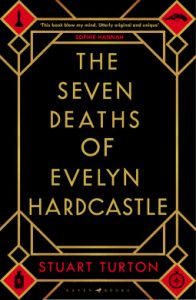 The most recent book that really stands out in my memory is The Seven Deaths of Evelyn Hardcastle, by Stuart Turton. It comes out in February 2018, and I got a lovely ARC from my agent, Harry.
The most recent book that really stands out in my memory is The Seven Deaths of Evelyn Hardcastle, by Stuart Turton. It comes out in February 2018, and I got a lovely ARC from my agent, Harry.
It’s not strictly fantasy, but it is … how can I put this? It’s a murder mystery set in 1920s London, but it’s also about body-hopping, time travel, memory loss and identity.
It’s clever, devious, has more twists than a Curly-Wurly on a carousel, and is creepy as hell. It’s a lead title for Bloomsbury, and is being billed as Gosford Park meets Inception by way of Agatha Christie. I absolutely loved it.
Okay, time to escalate things: reality warps and you suddenly find yourself leading a D&D-style party through a monster-infested dungeon. What character class are you, and what’s your weapon of choice?
Ah crap. I’ve never played D&D, much to my eternal shame. Right, let me just do a bit of research…
…
…
OK, I’m going to go with Rogue because I think that suits my sneaky personality quite well. I’d love to say I’m an honourable, toe-to-toe sort of fighter, but no. I’m very happy to club someone on the back of the head while they’re not looking and then creep past them.
As for weapon, I think a bow suits Rogues quite well. With added knives for added protection.
Nice answer, Anna – and nice research skills! When you’re not trawling through dungeons with knives, bows and Google, do you prefer to type or to hand-write? Why?
I’ve developed a bit of a hybrid style over the past year that seems to serve me quite well. When I’m in full on drafting mode, I type, but when I get stuck on how to move forward or resolve a plot twist, or logistics of moving people around etc, I prefer to hand-write to figure it out.
I’ll have twenty pages of the same scene hand-written with different outcomes.
I think there’s something more creative about the process of hand-writing that engages the brain more fully, and I find it easier to solve problems about narrative, plot or structure by hand than onto my laptop.
And how do you like to work – in silence, with music, or serenaded by the damned souls of a thousand dead shrimps?
Shrimps are good.
Most of the time it’s pretty quiet, except for the ticking of the clock, which can send me into a bit of a trance – which is sometimes really useful. It takes the conscious part of my brain out of the way of the subconscious, which is where the juicy stuff comes from.
But it can get quite oppressive to be in silence all day long, so I’ll usually listen to music for a couple of hours. Nearly always instrumental – soundtracks, classical, Two Steps from Hell. The soundtracks for Last of the Mohicans and Dances With Wolves are current favourites because they’re so damn epic.
When I’m editing, I’ll probably listen to a mixture, with David Bowie, Brian Eno, Alter Bridge and some Metallica thrown in.
Are you an architect or a gardener? A plotter or a pantser? D’you write in your underwear, or in a deep-sea diver’s suit? Tell us something unusual about your writing method!
Definitely more of a gardener; I like to let my subconscious figure stuff out while I work on different bits.
These days I do plot, but that’s because I have deadlines to work to – before that, it was pants all the way. However, I don’t let the plot dictate everything; if something just isn’t working, I let my intuition take over as it generally already knows what’s supposed to happen and the plot has taken me away from the organic approach.
I usually write standing up these days, at my stand-up desk. It makes my feet hurt – a lot – but it’s cured my low back pain, so I’m counting that as a win.
No deep sea diving suit, I’m afraid, but I try to avoid putting the central heating on at all costs, so I can usually be found fully dressed with my Doctor Who dressing gown on over the top – and pink fingerless gloves. It’s a look, I’m telling you. Not a good look, but definitely a look.
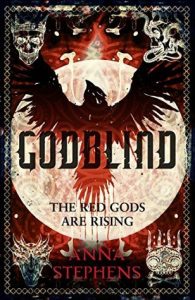 Definitely. What are your most significant non-book fantasy influences?
Definitely. What are your most significant non-book fantasy influences?
As I said, I’m not a gamer (I know, I know) so for me, fantasy influences that weren’t books came in the form of films. I was – and am – a huge fan of Ray Harryhausen films – so Sinbad, Jason and the Argonauts etc – as well as films like The Princess Bride, The Dark Crystal and Labyrinth.
Star Wars and Star Trek, and yes, I know they’re sci-fi, but they were a huge influence too.
On TV, it was Thundercats, He-Man and She-Ra, Buffy, Xena etc when I was growing up that I loved.
When The Lord of the Rings films came out, I was completely overwhelmed – they were everything I hoped they’d be, even with the small plot changes made here and there. And their success was, I think, instrumental in showing TV execs and producers that the appetite for fantasy was out there. I don’t think we’d have Game of Thrones without LOTR. I don’t think anyone would have risked a budget that huge if they hadn’t seen it work so well before.
What was the last thing you watched on TV and why did you choose to watch it?
We’re currently watching the BBC4 Vietnam war series. It’s 10 episodes long, each covering a year of the war, and it took the producers a decade to put it together – they interview dozens of marines, chopper pilots, protesters etc in America, and also members of the NVA, Viet-cong and ARVN.
The footage pulls no punches – they make extensive use of the videos taken by war journalists and photographers, and there’s footage of a South Vietnamese officer shooting a prisoner in the head that I suspect I’ll never be able to unsee – and the statistics and atrocities are … shameful. Last night’s episode was about my the My Lai massacre and now the US army covered it up for two years.
Why am I watching it? Mostly because I think it’s important to know about our recent history and events that happened around the world that have had lasting effects.
But also the writing part of my brain never switches off any more, so that part of my head is interested to hear how the two sides remember the conflict, what their body language is like and how their faces change when they describe beating someone to death in the pitch blackness of a tunnel in Cu Chi. What they thought about what they did, why they did it, the differences between those who volunteered and those who were drafted.
They also cover the politics back in Washington and that’s fascinating – the promises Nixon made in order to win the presidency, and then what he actually did to end (or not) the war.
The world shifts, and you find yourself with an extra day on your hands during which you’re not allowed to write or otherwise do any work. How do you choose to spend the day?
That would definitely be the one day in my life when I’d have an idea for the most amazing novel ever that is guaranteed to be a bestseller – and I wouldn’t be able to write it down and then I’d forget it. It sounds horrendous.
Supposing that didn’t happen, however, I’d probably spend the morning reading, take the Husband to the pub in the afternoon, and then binge-watch movies in the evening.
If you could choose one punctuation mark to be made illegal, which would it be and why?
The exclamation mark. It gets used way too much, and if you’ve written it correctly, people can see the emotion jump off the page anyway. So it’s pointless. I try and keep them to an absolute minimum in my work, but I do use them sometimes.
(*looks guiltily at all the exclamation marks in these interview questions*) In no more than three sentences, tell us a little something about your current work in progress!
Darksoul is the sequel to Godblind in which we find out what happens to all the main players – some of them don’t make it. Things go from bad to worse to bone (yes, I recently watched Dog Soldiers for the 900th time) for Dom, with the torment he suffers at the hands of the Red Gods. And the Gods of Light finally begin to make their play.
If you could co-write or co-create a series (like The Expanse, or the Malazan Book of the Fallen), who would you choose to work with and why?
I’m not sure how easy I’d be to work with on a book, to be honest, as my style is very much my style and I don’t know if I could easily adapt it in line with someone else’s thinking – it’s hard enough when I get copy edits back!
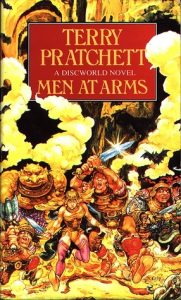 So I think I’d have to go for something that wasn’t book-related, and I’d choose to co-create a TV series adapting The Watch books from Sir Terry Pratchett’s Discworld. I think that way I’d get input into the visuals, the casting, the effects as well as the script writing and just have more overall control of the end product.
So I think I’d have to go for something that wasn’t book-related, and I’d choose to co-create a TV series adapting The Watch books from Sir Terry Pratchett’s Discworld. I think that way I’d get input into the visuals, the casting, the effects as well as the script writing and just have more overall control of the end product.
The Watch books are my favourite miniseries within Discworld and I think they have some of the absolute best characters, so I’d love to work with bringing that to the screen.
I don’t think the adaptations that have been made of his work so far have done it justice in any way; Going Postal, for instance, I just didn’t find funny, and it’s one of my favourite books.
So working closely with his estate, and then with a creator like Michelle Lovretta, who has worked on Killjoys and which is one of my favourite TV shows, would be an amazing experience.
What’s the most (and/or least) helpful piece of writing advice you’ve ever received?
Huh, well I’m not sure it was meant as advice and more as an attack on my personal integrity, but I was recently told that any artist who accepts amendments to their work from a third party (in my case, an editor) has ‘sold out’. That we value money over integrity.
The speaker was a self-professed abstract artist, who said she’d never accept any input over her work as it belongs solely to her and is her vision. I could have pointed out that this is why she’s never sold a painting in her life, but I’m far too professional for that.
So that was … less than helpful, because as we all know, an editor and an agent and a decent beta-reader only has one aim in mind – to make your work better.
If that subsequently makes you a better writer, then I don’t see it as a problem. You’re learning – those people are your teachers at that point, pointing out what you’re too close to see or what you know in your head to be true but neglected to put on the page for your readers.
As for best advice, I think it was the first time I was asked the dreaded question: does this move the plot along?
It wasn’t advice per se, but I’ve taken it as such and, while it’s the most hated question in the world for me (other than, “oh fantasy? So you’re the next JK Rowling, are you?”), it’s absolutely crucial for me to look objectively at my work.
If you could visit any country at any point in history, where/when would you go, and why?
This is a really tough question! There’s so many places I want to visit in this time, let alone in the past, that I’ll probably never get to.
Um, I’m going to go for Ancient Britain – pagan times, but building of Stonehenge to discover why – and how – they moved those bluestones and what they meant. To learn about their culture and society, their gods and beliefs, their warrior practices etc.
Every writer encounters stumbling blocks, be it a difficult chapter, challenging subject matter or just starting a new project. How do you motivate yourself on days when you don’t want to write?
I do tend to procrastinate if it’s something I don’t want to write, but then I ask myself why I don’t want to write it? I’ll usually spend some time figuring that out – sometimes, if it’s a chapter in a longer project, it’ll be because I know, deep down, that it isn’t right, so then once I’ve identified that, I can work out how it needs to change.
If I’ve got real writer’s block about a section/chapter/plot development that I know needs to go in there and I’m just not motivated to write it, I’ll jump ahead to the next section and write that as though the previous bit already exists. Usually, that then kickstarts my brain for the preceding section and I can go back and write that.
If it’s a brand new project and I’m not really sure how to start it, I might try a few different openings from a few different POVs. Failing that, open with a fight scene or some other sort of high-octane action – it gets the blood pumping and fires me up, and even though that scene will probably get cut, it’s thrust me into the world I’m writing about and I find it easier to keep going after that.
Tell us about a book that’s excellent, but underappreciated or obscure.
Godblind is an excellent book that isn’t currently as well-known as it should be…. That’s not what you want, is it? Damn.
Spoilsports.
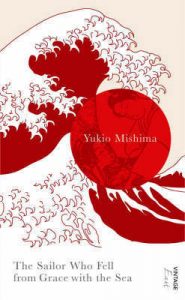 I’m going to go for The Sailor Who Fell From Grace With The Sea, by Yukio Mishima. It’s the story of a group of 13 year old boys in Japan who decide the world is soft, romantic and weak. They train themselves in ‘objectivity’ and not to care about anyone or anything. They believe the world is brutal and they need to be the same to thrive in it.
I’m going to go for The Sailor Who Fell From Grace With The Sea, by Yukio Mishima. It’s the story of a group of 13 year old boys in Japan who decide the world is soft, romantic and weak. They train themselves in ‘objectivity’ and not to care about anyone or anything. They believe the world is brutal and they need to be the same to thrive in it.
One of the boys’ mothers begins an affair with a sailor, and the boys decide to test the limits of their objectivity on him in a brutal attack.
That’s about as much as I can say without giving everything away, but it was first published in 1963, so it’s a little younger than The Lord of the Flies and I don’t know whether Mishima took any inspiration from that, but it’s an astonishing, thought-provoking little book and style of writing is so spare and austere that there’s no cushioning the boys’ outlook or behaviour.
It’s wonderful, haunting and very disturbing.
Finally, would you be so kind as to dazzle us with what we like to call a ‘shark elevator pitch’? (It’s exactly the same as an elevator pitch, but with sharks.) (Well, one shark. Which, by the way, is currently picking between its rows of teeth to try and dislodge the remains of the last author who stepped onto its elevator.)
Ahem. So: why should readers check out your work? A shark elevator pitch of your own book(s) in no more than three sentences – go!
Can I spend the first sentence screaming that I’m in an elevator with a shark?
Godblind and its sequels is epic fantasy on the grittier side of the genre, and deals with betrayal, religious warfare and epic battles as the Mireces invade the country of Rilpor from the western border to bring their religion and their gods back to prominence, no matter the cost.
Amid the chaos and oath-breaking, heroes step forward to defend their homes and their people, willing to sacrifice everything they are and everything they have to repel the invaders and bring about peace, and hope and love in the most unexpected places provide the only reasons to keep going in a world on fire.
Brilliant! Our own Michael Everest certainly enjoyed reading Godblind; you can read his review here. But the king is still dead (at his own banquet, no less), and those royal guards are getting closer. It’s looking like a quick interrogation and even quicker execution are on the cards, Anna. Thankfully, having now answered our questions, you may activate the magical Hiveguffin Scenario Randomiser™ . . .
. . . whoops! You summoned an armored rhino named Steve. Steve rampages through the banquet hall, crushing guests, guards and tables alike underfoot before finally stopping to snaffle a few bites of the peach- and ruby-filled anglerfish. If you jump on his back now, you can ride him to freedom. Go, Anna! Go! Go! Go!
Anna Stephens is the author of GODBLIND and DARKSOUL.

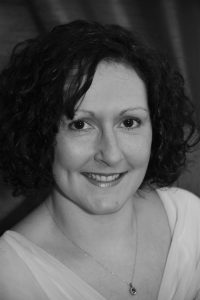
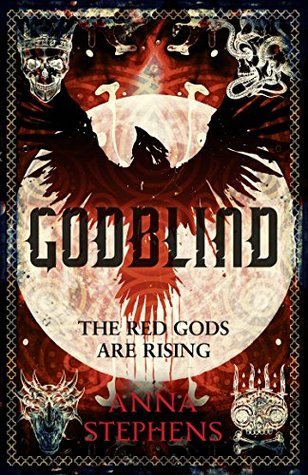
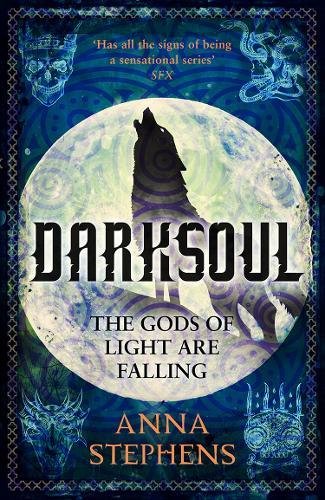
[…] I’ve read that, like me, you enjoy hand-writing some aspects of your work. In your interview with The Fantasy Hive you mentioned that you’ve sometimes written a scene with different outcomes. Are you able to […]
[…] You can also read an excellent interview with Anna Stephens on The Fantasy Hive’s Author Spotlight. […]